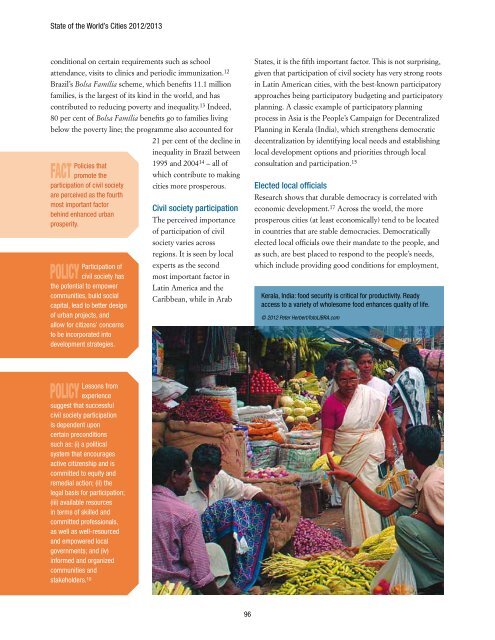From Comparative Advantage to Urban Prosperityparticipation and erodes <strong>the</strong> relationships between <strong>the</strong>citizenry and <strong>the</strong> level <strong>of</strong> government closest to <strong>the</strong>m. 7Box 3.1 highlights how decentralization can play a keyrole in <strong>the</strong> prosperity <strong>of</strong> <strong>cities</strong>.While <strong>the</strong> responsibilities <strong>of</strong> municipal governmentshave increased following reforms in recent years, many haveno access to <strong>the</strong> financial resources needed to undertake<strong>the</strong>se functions. This naturally creates a mismatch betweenresponsibilities and financial resources, and is a majorreason why decentralization has been less than successful incertain countries.National reforms relating to various aspects <strong>of</strong>decentralization – revenue allocation, communityparticipation, local elections, local planning, pro-urbandevelopment strategies – all provide <strong>the</strong> enablingenvironment for <strong>cities</strong> to prosper.Box 3.1.1Decentralization and <strong>the</strong> prosperity <strong>of</strong> <strong>cities</strong>A major benefit <strong>of</strong> decentralization as it relates to <strong>the</strong> prosperity<strong>of</strong> <strong>cities</strong> is that delivery <strong>of</strong> essential services such as water,sanitation and waste management, health and education canbe carried out more effectively. Decentralization can makefor better service delivery by providing greater opportunitiesfor community-based groups to lobby for improved services.Proximity to physical demand for a service encourageseffectiveness and promotes a more rational use <strong>of</strong> resources,while also allowing for closer monitoring by <strong>the</strong> beneficiarypopulation <strong>of</strong> projects intended to serve <strong>the</strong>m.The devolution <strong>of</strong> authority can foster communityparticipation, too. Decentralization can lead to an institutionalframework through which various political, religious, social,ethnic groups and multi-levels including towns and <strong>cities</strong>, canparticipate in making decisions that will affect <strong>the</strong>m.Decentralized decision-making can provide a betterframework for poverty reduction, so long as it is accompaniedby fiscal devolution <strong>of</strong> powers to municipal authorities.Decentralization can accelerate economic development throughactive engagement <strong>of</strong> regional and municipal governmentunits and local enterprises in economic activities. The transfer<strong>of</strong> authority and resources to local units <strong>of</strong> government andadministration to design and implement programmes providesmore opportunities for local citizens to play a more direct rolein <strong>the</strong> development process. As catalysts for development andlocal change agents, <strong>the</strong>y can make decisions about location <strong>of</strong>services and determine priorities.Source: UN-Habitat (<strong>2012</strong>) Decentralization in Iraq: Challenges andSolutions for Federal and Local Governments, Nairobi: UN-HabitatpolicyFor decentralization to streng<strong>the</strong>n urban authorities’commitment to urban prosperity, it must be backed byfiscal devolution.System that createsequal opportunitiesThe importance <strong>of</strong> thisfactor is most pronouncedin Arabs States comparedwith o<strong>the</strong>r regions. Thisis because Arab Statesare one <strong>of</strong> <strong>the</strong> mostegalitarian in terms <strong>of</strong>income distribution in <strong>the</strong>developing world. This isreflected in an overall (low)Gini coefficient <strong>of</strong> 0.36,which has been decliningover time. 9 The low degree<strong>of</strong> inequality in <strong>the</strong> regionhas been attributed to astrong, cohesive social system, and <strong>the</strong> fact that redistributionconstitutes a policy priority in Islamic economies. 10A system that creates equal opportunities for all canuse redistributive policies that give priority to low-incomegroups and areas. In Venezuela, <strong>the</strong> government has usedredistributive policies to bring significant improvementsto <strong>the</strong> living standards <strong>of</strong> <strong>the</strong> urban poor throughmassive investment in health and education. 11 With <strong>the</strong>provision <strong>of</strong> over 8,000 clinics in <strong>the</strong> barrios, people areable to access health services 24 hours a day at no cost.Similarly, illiteracy has been eliminated, pupils are nolonger restricted to elementary school, and those with <strong>the</strong>required academic qualifications can attend university.Ano<strong>the</strong>r form <strong>of</strong> redistribution policy involvesconditional cash transfers. These enhance <strong>the</strong> humancapital <strong>of</strong> beneficiaries through transfers which are madepolicypolicy Decentralizationworks wellwhen backed by strongcommitment and supportfrom central government. 8factA system thatguarantees equalopportunities for all is<strong>the</strong> third important factorunderlying <strong>the</strong> prosperity <strong>of</strong><strong>cities</strong>. The more egalitariana city, <strong>the</strong> more prosperousit becomes.For a city to be truly prosperous, it must deploysystems that will ensure equal opportunities for all,especially <strong>the</strong> more vulnerable – <strong>the</strong> poor, women, children, <strong>the</strong>elderly, youth and <strong>the</strong> disabled. A prosperous city is one where <strong>the</strong>aspirations <strong>of</strong> all segments <strong>of</strong> <strong>the</strong> population are realized. Highlyunequal <strong>cities</strong> are a ticking time bomb waiting to explode.95
State <strong>of</strong> <strong>the</strong> World’s Cities <strong>2012</strong>/<strong>2013</strong>conditional on certain requirements such as schoolattendance, visits to clinics and periodic immunization. 12Brazil’s Bolsa Família scheme, which benefits 11.1 millionfamilies, is <strong>the</strong> largest <strong>of</strong> its kind in <strong>the</strong> world, and hascontributed to reducing poverty and inequality. 13 Indeed,80 per cent <strong>of</strong> Bolsa Família benefits go to families livingbelow <strong>the</strong> poverty line; <strong>the</strong> programme also accounted for21 per cent <strong>of</strong> <strong>the</strong> decline ininequality in Brazil betweenPolicies that1995 and 2004 14 – all <strong>of</strong>fact promote <strong>the</strong>which contribute to makingparticipation <strong>of</strong> civil society <strong>cities</strong> more prosperous.are perceived as <strong>the</strong> fourthmost important factorbehind enhanced urbanprosperity.policyParticipation <strong>of</strong>civil society has<strong>the</strong> potential to empowercommunities, build socialcapital, lead to better design<strong>of</strong> urban projects, andallow for citizens’ concernsto be incorporated intodevelopment strategies.Civil society participationThe perceived importance<strong>of</strong> participation <strong>of</strong> civilsociety varies acrossregions. It is seen by localexperts as <strong>the</strong> secondmost important factor inLatin America and <strong>the</strong>Caribbean, while in ArabStates, it is <strong>the</strong> fifth important factor. This is not surprising,given that participation <strong>of</strong> civil society has very strong rootsin Latin American <strong>cities</strong>, with <strong>the</strong> best-known participatoryapproaches being participatory budgeting and participatoryplanning. A classic example <strong>of</strong> participatory planningprocess in Asia is <strong>the</strong> People’s Campaign for DecentralizedPlanning in Kerala (India), which streng<strong>the</strong>ns democraticdecentralization by identifying local needs and establishinglocal development options and priorities through localconsultation and participation. 15Elected local <strong>of</strong>ficialsResearch shows that durable democracy is correlated wi<strong>the</strong>conomic development. 17 Across <strong>the</strong> world, <strong>the</strong> moreprosperous <strong>cities</strong> (at least economically) tend to be locatedin countries that are stable democracies. Democraticallyelected local <strong>of</strong>ficials owe <strong>the</strong>ir mandate to <strong>the</strong> people, andas such, are best placed to respond to <strong>the</strong> people’s needs,which include providing good conditions for employment,Kerala, India: food security is critical for productivity. Readyaccess to a variety <strong>of</strong> wholesome food enhances quality <strong>of</strong> life.© <strong>2012</strong> Peter Herbert/fotoLIBRA.compolicyLessons fromexperiencesuggest that successfulcivil society participationis dependent uponcertain preconditionssuch as: (i) a politicalsystem that encouragesactive citizenship and iscommitted to equity andremedial action; (ii) <strong>the</strong>legal basis for participation;(iii) available resourcesin terms <strong>of</strong> skilled andcommitted pr<strong>of</strong>essionals,as well as well-resourcedand empowered localgovernments; and (iv)informed and organizedcommunities andstakeholders. 1696





